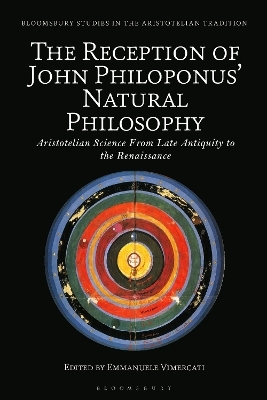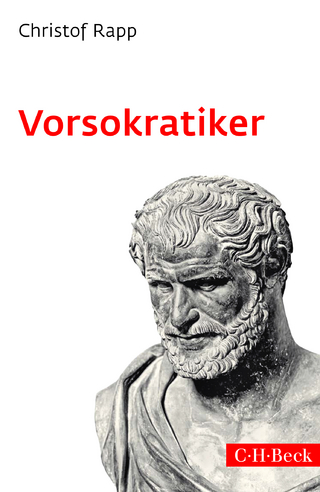
The Reception of John Philoponus’ Natural Philosophy
Bloomsbury Academic (Verlag)
978-1-350-41627-7 (ISBN)
Divided into three parts, the first part of the volume introduces central concepts in Philoponus’ philosophy. Highlighting the areas of crossover as well as of disagreement with Aristotle, chapters dedicate specific attention to Philoponus’ theories of place, matter and vacuum; his ideas of motion; his discussion of the heavens and the fifth element; and his anthropology. This is followed, in parts two and three, by a focus on Philoponus’ reception in the Middle Ages and the Renaissance respectively. Shedding light on the scientific ideas circulating in these periods, international experts explore a range of topics from the renewal of Aristotelianism in the Arab world, through the medieval Byzantine and Latin traditions, to Philoponus’ appearance in the early works of Galileo.
Engaging with a number of Philoponus’ key tracts, The Reception of John Philoponus’ Natural Philosophy is both a much-needed study of Philoponus’ influence and a revealing analysis of how Aristotelian science was received, adapted, critiqued and mediated throughout the Middle Ages and the Renaissance.
Emmanuele Vimercati is Professor of History of Ancient Philosophy at the Pontifical Lateran University, Rome, Italy. His previous titles include Fate, Providence and Free Will: Philosophy and Religion in Dialogue in the Early Imperial Age (2020), co-edited with R. Brouwer, and Nicholas of Cusa and the Aristotelian Tradition. A Philosophical and Theological Survey (2020), co-edited with V. Zaffino.
Introduction, Emmanuele Vimercati (Pontifical Lateran University, Rome, Italy)
Part I: Late Antiquity (and Its Legacy)
1. John Philoponus’ Absolute Place and Its Reception by Francisco of Toledo, Ioannis Papachristou (National and Kapodistrian University, Athens, Greece)
2. Philoponus on Natural and Impressed Power, Emmanuele Vimercati (Pontifical Lateran University, Rome, Italy)
3. Philoponus on the Nature of the Heavens. Revisiting Some Old Debates, Marc-Antoine Gavray (University of Liège, Belgium)
4. John Philoponus on Being Human, Mark Edwards (University of Oxford, UK)
Part II: The Medieval Tradition
5. Proclus, Philoponus and the Brethren of Purity on the Eternity of the World, Carmela Baffioni (University of Naples – L’Orientale, Italy)
6. Averroes as Critic and Continuator within the Heritage of Philoponus’ Philosophical Theology, David Twetten (Marquette University, USA)
7. Philoponus’ Natural Philosophy in the Medieval Byzantine World: Psychological and Cosmological Debates, Tommaso De Robertis (University of Macerata, Italy and University of Toronto, Canada)
8. Philoponus and the Renewal of Aristotelian Cosmology in the Late Latin Middle Ages, Alessandro Ghisalberti (Catholic University, Milan, Italy)
Part III: Renaissance
9. Why Aristotle? Patterns in Renaissance Philosophy, Paul Richard Blum (Loyola University Maryland, USA and Palacký University Olomouc, Czech Republic)
10. Philoponus’ Metaphysical Cosmology in Renaissance Debates, Pietro Daniel Omodeo (University “Ca’ Foscari”, Venice, Italy)
11. Francesco Piccolomini (1523-1607) and Giacomo Zabarella (1533-1589) on Philoponus’ Definition of Prime Matter, Antonio Petagine (University of Roma Tre, Italy)
12. Philoponus’ Contribution to Copernicus’ Doctrine of Gravity, Dilwyn Knox (University College London, UK)
13. Philoponus in Galileo’s Early Works, Flavia Marcacci (University of Urbino "Carlo Bo", Italy)
Index
| Erscheinungsdatum | 26.11.2024 |
|---|---|
| Reihe/Serie | Bloomsbury Studies in the Aristotelian Tradition |
| Verlagsort | London |
| Sprache | englisch |
| Maße | 156 x 234 mm |
| Themenwelt | Geisteswissenschaften ► Philosophie ► Philosophie Altertum / Antike |
| Geisteswissenschaften ► Philosophie ► Philosophie des Mittelalters | |
| Naturwissenschaften | |
| ISBN-10 | 1-350-41627-4 / 1350416274 |
| ISBN-13 | 978-1-350-41627-7 / 9781350416277 |
| Zustand | Neuware |
| Informationen gemäß Produktsicherheitsverordnung (GPSR) | |
| Haben Sie eine Frage zum Produkt? |
aus dem Bereich


